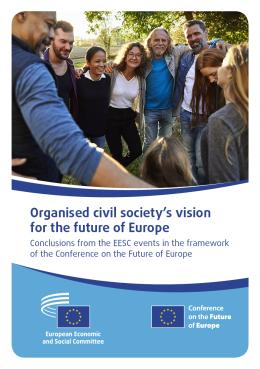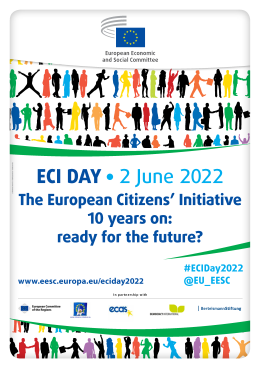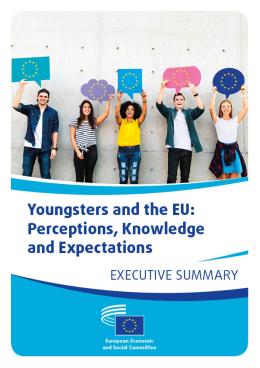European Economic
and Social Committee
Main navigation
-
Περισσότερες πληροφορίες
ABOUT
The European Economic and Social Committee (EESC) is the voice of organised civil society in Europe.
Find out more about its role and structure at http://www.eesc.europa.eu/en/about
- Πολιτική οργάνωση
- Διοικητική οργάνωση
- ΣΥΝΕΡΓΑΣΙΑ ΜΕ ΑΛΛΟΥΣ ΟΡΓΑΝΙΣΜΟΥΣ
- Rules
-
Το έργο μας
OUR WORK
The EESC issues between 160 and 190 opinions and information reports a year.
It also organises several annual initiatives and events with a focus on civil society and citizens’ participation such as the Civil Society Prize, the Civil Society Days, the Your Europe, Your Say youth plenary and the ECI Day.
Find the latest EESC opinions and publications at http://www.eesc.europa.eu/en/our-work/opinions-information-reports/opinions and http://www.eesc.europa.eu/en/our-work/publications-other-work/publications respectively.
- Γνωμοδοτήσεις και ενημερωτικές εκθέσεις
- Έγγραφα
- Δημοσιεύσεις και λοιπές εργασίες
-
Η κοινωνία πολιτών και συμμετοχή των πολιτών στα κοινά
- Civil Society Week
- European elections 2024
- Βραβείο της κοινωνίας πολιτών
- The Conference on the Future of Europe
- Ευρωπαϊκό διαβατήριο δημοκρατίας
- Η δική σου Ευρώπη, η δική σου φωνή!
- Ευρωπαϊκή πρωτοβουλία πολιτών (ΕΠΠ)
- The path to our industrial future
- Youth Climate and Sustainability Round Tables
- EU Organic Awards
- Civil Society Against COVID 19
- EESC stands with Ukraine
- Partnerships
- Relations with ESCs
-
Πολιτικές
POLICIES
The EESC is active in a wide range of areas, from social affairs to economy, energy and sustainability.
Learn more about our policy areas and policy highlights at http://www.eesc.europa.eu/en/policies
-
Τομείς πολιτικής
- Γεωργία, αγροτική ανάπτυξη και αλιεία
- Δράση για το κλίμα
- Πολιτική συνοχής, περιφερειακή και αστική πολιτική
- Καταναλωτές
- Ψηφιακή αλλαγή και κοινωνία της πληροφορίας
- Οικονομική και Νομισματική Ένωση
- Εκπαίδευση και κατάρτιση
- Απασχόληση
- Ενέργεια
- Επιχειρηματικότητα
- Περιβάλλον
- Εξωτερικές σχέσεις
- Χρηματοπιστωτικές υπηρεσίες και αγορές κεφαλαίων
- Θεμελιώδη δικαιώματα και δικαιώματα των πολιτών
- Housing
- Βιομηχανία και βιομηχανική μεταλλαγή
- Θεσμικές υποθέσεις και προϋπολογισμός της ΕΕ
- Μετανάστευση και άσυλο
- Έρευνα και καινοτομία
- Υπηρεσίες κοινής ωφελείας
- Ενιαία αγορά
- Κοινωνικές υποθέσεις
- Βιώσιμη ανάπτυξη
- Φορολογία
- Μεταφορές
-
Ενδιαφέροντα σημεία
- Call to EU candidate countries civil society
- EESC stands with Ukraine
- The Conference on the Future of Europe
- Ευρωπαϊκή πλατφόρμα ενδιαφερομένων φορέων για την κυκλική οικονομία
- European Gender Equality Week
- COP 29
- Youth participation at the EESC
- EU Blue Deal
- Cost of living
- ConnectingEU
- EU Rural Pact
-
Τομείς πολιτικής
-
Πρόγραμμα
AGENDA
The EESC holds nine plenary sessions per year. It also organises many conferences, public hearings and high-level debates related to its work.
Find out more about our upcoming events at http://www.eesc.europa.eu/en/agenda/our-events/upcoming-events
- Οι εκδηλώσεις μας
-
Ειδήσεις και ΜΜΕ
NEWS & MEDIA
Here you can find news and information about the EESC'swork, including its social media accounts, the EESC Info newsletter, photo galleries and videos.
Read the latest EESC news http://www.eesc.europa.eu/en/news-media/news and press releases http://www.eesc.europa.eu/en/news-media/press-releases
- President
-
Μέλη και Ομάδες
MEMBERS & GROUPS
The EESC brings together representatives from all areas of organised civil society, who give their independent advice on EU policies and legislation. The EESC's326 Members are organised into three groups: Employers, Workers and Various Interests.
Find out more about our Members and groups at http://www.eesc.europa.eu/en/members-groups
- Μέλη
- Ομάδες
-
Τμήματα και άλλα όργανα
SECTIONS & OTHER BODIES
The EESC has six sections, specialising in concrete topics of relevance to the citizens of the European Union, ranging from social to economic affairs, energy, environment, external relations or the internal market.
Find out more at http://www.eesc.europa.eu/en/sections-other-bodies
-
Τμήματα / Επιτροπή
- Οικονομική και Νομισματική Ένωση, οικονομική και κοινωνική συνοχή (ECO)
- Ενιαία Αγορά, παραγωγή και κατανάλωση (ΙΝΤ)
- Μεταφορές, ενέργεια, υποδομές, κοινωνία των πληροφοριών (TEN)
- Απασχόληση, κοινωνικές υποθέσεις, δικαιώματα του πολίτη (SOC)
- Γεωργία, αγροτική ανάπτυξη και περιβάλλον (NAT)
- Εξωτερικές σχέσεις (REX)
- Συμβουλευτική Επιτροπή Βιομηχανικών Μεταλλαγών (CCMI)
- Παρατηρητήρια
- Λοιπά
-
Τμήματα / Επιτροπή
- Ukraine





